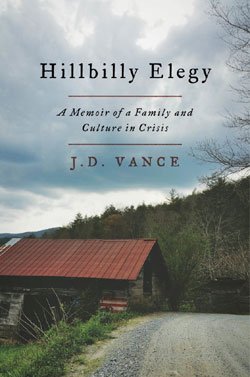I grew up in a different portion of Appalachia and am of a different (Roman Catholic – Lithuanian) ethnic background, but I shared J.D. Vance’s experience, a generation earlier, of attending an elite Ivy League school as a blue-collar background outsider. Our town’s last coal mine closed in 1954, and my father had to bribe his way into the Steamfitters’ union, so that he could work all week four hours from home, and then return on weekends. The summer after my high school graduation, before entering Yale, I was working on the same kind of construction projects, installing new bathrooms in Scarsdale’s Taj Mahal High School. I can recall sitting on a box, during lunch, reading the Scarsdale High School Yearbook, and counting twelve graduates of that year who would be my classmates. Nobody in the entire history of Shenandoah, Pennsylvania, before me, had ever gone to Yale.
I am currently reading J.D. Vance’s Hillbilly Elegy, with which I have strong, natural sympathies.
Yale planted a seed of doubt in my mind about whether I belonged. This place was so beyond the pale for what I expected of myself. I knew zero Ivy League graduates back home; I was the first person in my nuclear family to go to college and the first person in my extended family to attend a professional school. When I arrived in August 2010, Yale had educated two of the three most recent Supreme Court justices and two of the most six recent presidents, not to mention the sitting secretary of state (Hillary Clinton). There was some- thing bizarre about Yale’s social rituals: the cocktail receptions and banquets that served as both professional networking and personal matchmaking events. I lived among newly christened members of what folks back home pejoratively call the “elites,†and by every outward appearance, I was one of them: I am a tall, white, straight male. I have never felt out of place in my entire life. But I did at Yale.
Part of it has to do with social class. A student survey found that over 95 percent of Yale Law’s students qualified as upper-middle-class or higher, and most of them qualified as outright wealthy. Obviously, I was neither upper-middle-class nor wealthy. Very few people at Yale Law School are like me. They may look like me, but for all of the Ivy League’s obsession with diversity, virtually everyone—black, white, Jewish, Muslim, whatever— comes from intact families who never worry about money. Early during my first year, after a late night of drinking with my classmates, we all decided to stop at a New Haven chicken joint. Our large group left an awful mess: dirty plates, chicken bones, ranch dressing and soda splattered on the tables, and so on. I couldn’t imagine leaving it all for some poor guy to clean up, so I stayed behind. Of a dozen classmates, only one person helped me: my buddy Jamil, who also came from a poorer background. Afterward, I told Jamil that we were probably the only people in the school who’d ever had to clean up someone else’s mess. He just nodded his head in silent agreement.






bob sykes
This culture goes back literally hundreds of years, and is probably pre-Roman in Scotland. It has always been economically marginal, because that is all that mountain life allows. The culture will continue to exist (if not thrive) as long as people live in the hills.
Please Leave a Comment!